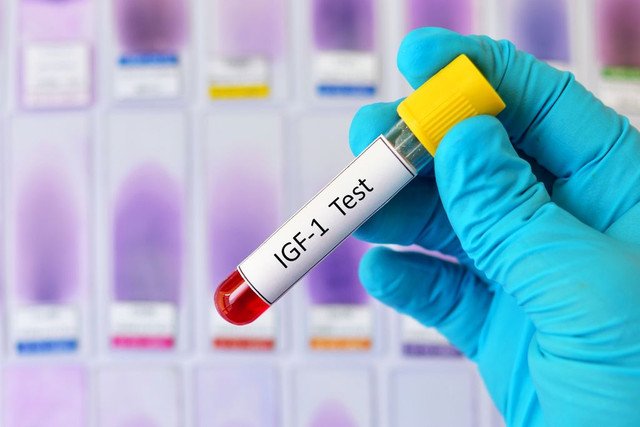
Insulin-like Growth Factor 1
Insulin-like growth factor-1 (IGF-1) is a hormone that helps promote normal bone and tissue growth. The other hormones in your body's endocrine system work with IGF to keep the cells healthy, which consequently affects how quickly you grow.
IGF is one of many substances produced when certain tissues such as muscle are damaged; it serves an important role in helping repair those injuries so they can heal properly. As we grow older our levels of IGF decline. However, they also increase rapidly after injury to stimulate healing more quickly because muscles create less growth hormone.
Also called somatomedin C, insulin like growth factor is a hormone that plays an important role in childhood growth as well as the development of muscle and bone during adulthood. IGF has been shown to stimulate protein synthesis within cells which helps with cell division.
It also stimulates collagen production for skin elasticity.
With the help of growth hormone, IGF is able to produce many changes in your body. It increases the amount and size of muscle cells while increasing bone density at a rapid pace.
This powerful peptide also plays an important role in glucose metabolism by releasing insulin that has been stored. It also curbs appetite so you don't overeat.
Human growth hormone (HGH)is the main hormone that makes us grow, but lacks a reliable testing method. However, new research has found an indicator of growth hormone levels in insulin like growth factor.
The study looked at 2 groups with varying degrees of excessive or deficient growth hormone and compared their results to those who had normal amounts for healthy adults, aged 20-35 years old on average.
The participants with low growth hormone levels showed lower than expected rates when it came time to measure insulin like Growth Factor 1 (IGF). With high enough levels during daytime hours, however, they could not be distinguished from people without any abnormality.
As a result of these findings, this test may have potential as a diagnostic tool if used correctly by doctors worldwide looking into these issues.
Deficiency of IGF and Growth Hormone
IGF levels vary over the course of a person's life. Levels are at their lowest in infancy and gradually increase throughout childhood, peaking during puberty before declining as adults age. It is possible that deficiencies in GH and IGF may be related to one's diet as well as certain lifestyle habits, such as a lack of exercise, malnutrition or the consumption of foods with low nutritional value.
Additionally, deficiencies in GH and insulin like growth factor may also be caused by the following:
- An improperly functioning pituitary gland producing insufficient pituitary hormones (a condition known as hypopituitarism)
- A non-growth hormone-secreting pituitary tumor that damage hormone-producing cells
- A lack of sensitivity to growth hormone. This non-responsiveness may be genetic or due to secondary conditions including malnutrition, hypothyroidism, low levels of sex hormones, diseases of the kidneys or liver, and congenital conditions. A lack of sensitivity to growth hormone due to genetic reasons (GH resistance) is extremely uncommon, with only around 300 instances reported globally.
A deficiency in IGF-1 can lead to a lack of bone growth and overall physical development. In children, this can result in a below-average size and height, and in adults it can result in decreased bone density and muscle mass, and abnormal lipid levels.
Unfortunately, testing for deficient growth hormone or IGF-1 levels is not typically performed on adults who experience reduced bone density and/or muscle mass without having other symptoms. This is mainly because their conditions are usually attributed to other factors, such as an age-related decline in hormone production.
Many of the symptoms related to low levels of insulin like growth factor can be treated by taking products like HGH pills and IGF-1 supplements, which may help those experiencing these symptoms to feel healthy again.
Excess Production of IGF and Growth Hormone
There are two rare conditions related to excess GH and IGF-1. Gigantism, which is characterized by abnormal growth of the bones, and acromegaly, which causes enlargement in some body parts like the hands or feet. The cause for these conditions can be due to a pituitary adenoma, which is a benign, slow-growing tumor that releases excessive amounts of growth hormone into your system. This in turn will cause almost any part to grow because of it's anabolic effect.
If you're diagnosed with either gigantism or acromegalic symptoms there may be treatment available. The tumor can usually be removed surgically and/or treated with radiation or drugs. In the majority of cases, this will result in HGH and IGF-1 levels to return to more or less normal levels.
Conclusion
In this article, we’ve explored the importance of IGF-1 in human health. I hope that by learning the role that your IGF plays and understanding what it does for you, you'll be able to make better decisions about your diet and lifestyle choices.
If you are interested in doing more research on IGF-1 or would like help boosting yours through dietary changes or other methods, take a look at the information at Andro HQ.